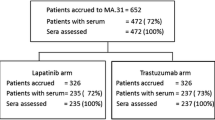Abstract
Objective
The significance of serum tumor markers in monitoring advanced breast cancer patients is still controversial. To clarify this issue, the Tumor Marker Study Group of the Japanese Breast Cancer Society conducted a prospective study.
Methods
Patients with advanced breast cancer who were treated with systemic therapy between January and December 2002 were recruited from five collaborative institutes in Japan. The patients were monitored every four weeks using three serum tumor markers, CEA, CA 15-3 and NCC-ST-439 during the therapy.
Results
Findings from 108 eligible patients were analyzed. The pretreatment positivity rates were 51.9% for CEA, 50% for CA 15-3, and 34.3% for NCC-ST-439. The changes in each marker level at 8 and 12 weeks but not at 4 weeks after the start of therapy seemed to correlate with the response to therapy in pretreatment marker-positive patients but not in negative patients. The Cox proportional hazard model revealed a greater than 20% reduction in CEA, CA 15-3 or NCC-ST-439 levels at 4, 8 and/or 12 weeks after the start of therapy to be an independent predictive factor for longer time-to-progression (TTP) in pretreatment marker-positive patients.
Conclusion
This prospective study supported the findings obtained from our previous retrospective study that in pretreatment marker-positive patients 1) the changes in serum tumor marker levels after the start of therapy correlate with the response to therapy; and 2) a greater than 20% reduction in the tumor marker levels was a favorable predictive factor for TTP during systemic therapy. When the pretreatment serum level of these markers is over the respective cut-off value, sequential measurement of them may be useful for evaluating the efficacy of treatment as well as monitoring the outcome of patients with advanced breast cancer.
Similar content being viewed by others
Abbreviations
- CEA:
-
Carcinoembryonic antigen
- TTP:
-
Time-to-progression
- CR:
-
Complete response
- PR:
-
Partial response
- NC:
-
No change
- PD:
-
Progressive disease
References
Bast RCJr, Ravdin P, Hayes DF,et al: American Society of Clinical Oncology Tumor Markers Expert Panel: 2000 update of recommendations for the use of tumor markers in breast and colorectal cancer: clinical practice guidelines of the American Society of Clinical Oncology.J Clin Oncol 19:1865–1878, 2001.
Kurebayashi J, Yamamoto Y, Tanaka K,et al: Current status of tumor markers of breast cancer in Japan: a questionanaire survey to the board members of the Japanese Breast Cancer Society.Jpn J Breast Cancer 17:165–169, 2002 (in Japanese with English Abstract).
Kurebayashi J, Yamamoto Y, Tanaka K,et al: Significance of serum carcinoembryonic antigen and CA 15- 3 in monitoring advanced breast cancer patients treated with systemic therapy: a large-scale retrospective study.Breast Cancer 10:38–44, 2003.
Hayward JL, Carbone PP, Heusen JC,et al: Assessment of response to therapy in advanced breast cancer.BrJ Cancer 35:292–298, 1977.
Tondini C, Hayes DF, Gelman R,et al: Comparison of CA15-3 and carcinoembryonic antigen in monitoring the clinical course of patients with metastatic breast cancer.Cancer Res 48:4107–4112, 1988.
Colomer R, Ruibal A, Salvador L: Circulating tumor marker levels in advanced breast carcinoma correlate with the extent of metastatic disease.Cancer 64:1674–1681, 1989.
Vizcarra E, Lluch A, Cibrian R,et al: Value of CA 15.3 in breast cancer and comparison with CEA and TPA: a study of specificity in disease-free follow-up patients and sensitivity in patients at diagnosis of the first metastasis.Breast Cancer Res Treat 37:209–216, 1996.
Guadagni F, Ferroni P, Carlini S,et al: A re-evaluation of carcinoembryonic antigen (CEA) as a serum marker for breast cancer: a prospective longitudinal study.Clin Cancer Res 7:2357–2362, 2001.
Kiang DT, Greenberg LJ, Kennedy BJ: Tumor marker kinetics in the monitoring of breast cancer.Cancer 65:193–199, 1990.
Sonoo H, Kurebayashi J: Serum tumor marker kinetics and the clinical course of patients with advanced breast cancer.Surg Today 26:250–257, 1996.
Robertson JF, Whynes DK, Dixon A,et al: Potential for cost economies in guiding therapy in patients with metastatic breast cancer.BrJ Cancer 72:174–177, 1995.
Author information
Authors and Affiliations
About this article
Cite this article
Kurebayashi, J., Nishimura, R., Tanaka, K. et al. Significance of serum tumor markers in monitoring advanced breast cancer patients treated with systemic therapy: A prospective study. Breast Cancer 11, 389–395 (2004). https://doi.org/10.1007/BF02968047
Received:
Accepted:
Issue Date:
DOI: https://doi.org/10.1007/BF02968047




